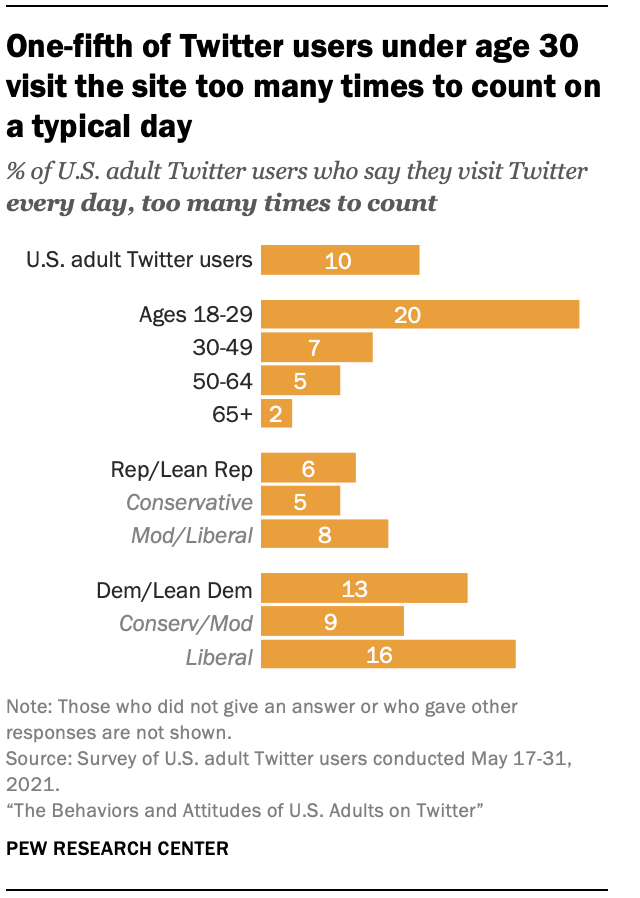
U.S. adults on Twitter visit the site with varying degrees of intensity. In all, two-thirds (66%) of Twitter users say they visit the site at least once a week, and the remaining third say they do so less often. And a share of users – 10% of the total – are far more regular visitors, saying they use the site so frequently that they cannot count the number of times in a typical day.
One-in-five adult Twitter users under age 30 say they visit the site daily, too many times to count. And along with younger users, some 16% of liberal Democratic users visit the site this frequently. Smaller shares of more moderate Democrats – and of Republicans of any ideology – say the same. (Throughout this report, partisans include those who lean toward both parties.)
Largest shares of users cite entertainment, staying informed as most important reasons for using Twitter
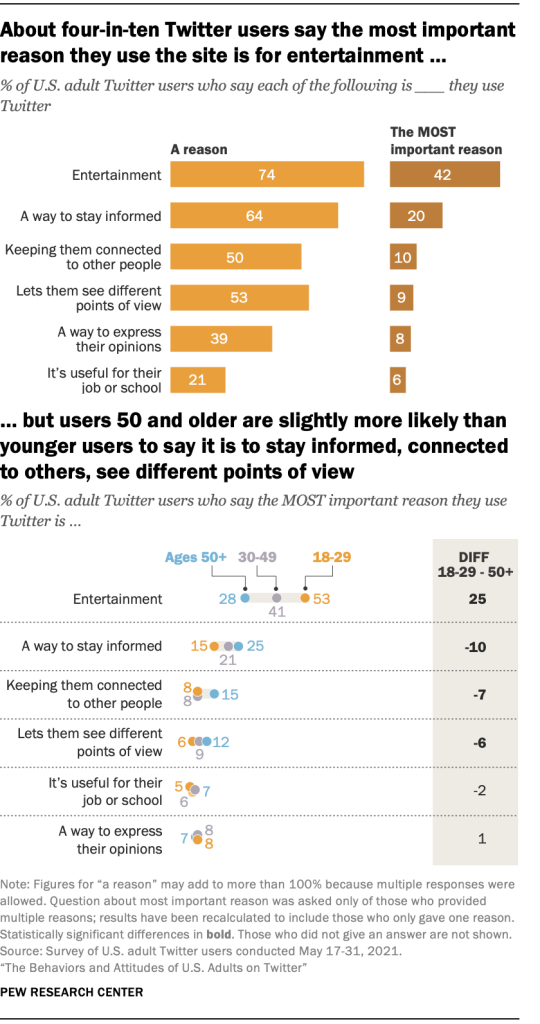
When asked about several specific reasons for using Twitter – as well as the one that was most important if they listed several reasons – the largest share of users (42%) report entertainment as the most important. This is about twice as high as the share (20%) who say staying informed is the most important reason. Smaller shares say the most important reason is to stay connected to other people, see different points of view, express their opinions, or because the site is useful for work or school.
These most important reasons vary by age. Twitter users ages 18 to 29 are far more likely to say that entertainment is their most important reason (53%) compared with older Twitter users – a 12 percentage point difference with those ages 30 to 49 and a 25-point difference with those 50 and older. Meanwhile, users 50 and older are slightly more likely than users 18 to 29 to say it’s that the site is a way to stay informed, keep themselves connected to other people or let them see different points of view – although differences are less pronounced.
The survey also finds that, for a majority of users, Twitter serves mostly as a way to see what others are saying rather than primarily serving as a means of expression.
When asked a separate question about which of these two factors is more of a reason they use the site, about two-thirds of Twitter users (64%) say they mostly use it to see what others are saying. Just 7% say they mostly use it to express their own opinions, while another 28% say it’s an equal mix of both.
46% of users say their Twitter use has increased their understanding of current events in the last year, but 26% say the same about their stress levels
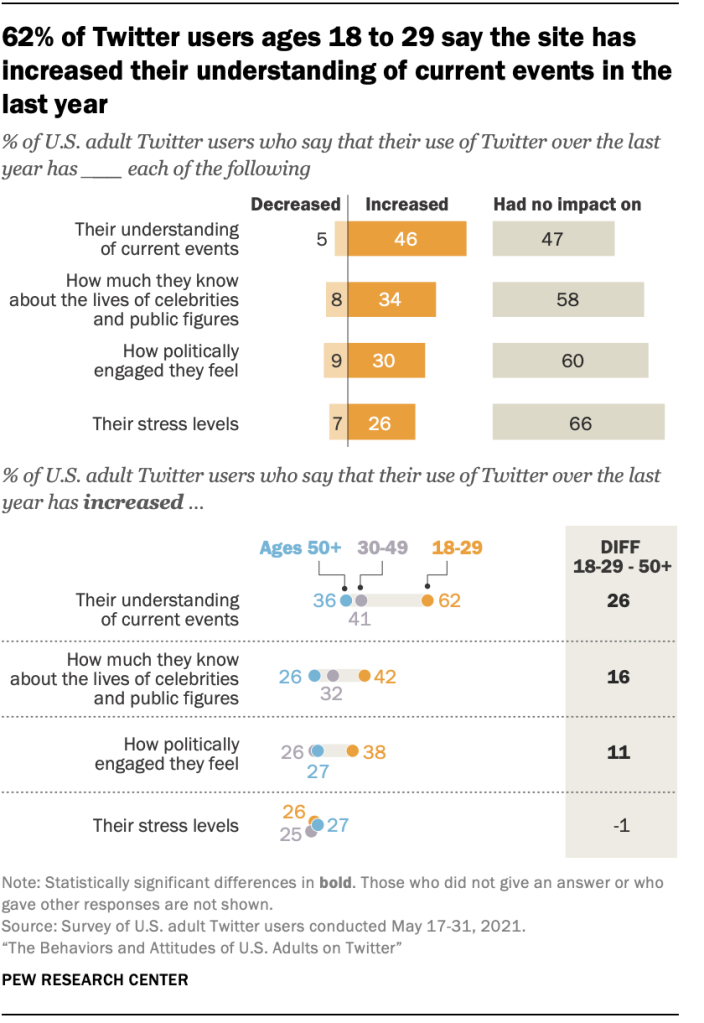
Center research has long studied the impact of Twitter and other social media platforms on the state of the country overall, particularly as it relates to groups of Americans and the information environment. This survey focused on the impact of the site on the individual user over the past year in four areas.
While about half or more adult Twitter users say their use of the site in the past year had no impact on their understanding of current events, how much they know about the lives of celebrities and public figures, how politically engaged they feel, or their stress levels, some users report an increase or decrease in these four areas.
Nearly half of U.S. adult Twitter users say their use of the site has increased their understanding of current events over the past year, but 47% say it has had no impact. Meanwhile, 34% say the site has increased how much they know about the lives of celebrities and public figures (with 58% reporting no impact). Small shares say Twitter has decreased their understanding in both these areas.
Three-in-ten Twitter users (30%) say their use of the site has increased how politically engaged they feel, while 9% say it has decreased this and 60% say it has had no impact. And about a quarter of Twitter users say the site has increased their stress levels.
Twitter users ages 18 to 29 are more likely than those ages 30 to 49 or 50 and older to report their use of Twitter has increased their understanding of current events, the lives of public figures and their overall levels of political engagement. Indeed, larger shares of those ages 18 to 29 report any impact on their political engagement, whether that impact is positive or negative. This group is twice as likely as older users to say it has decreased how politically engaged they feel (although just 14% of younger Twitter users indicate this).
And while there are no age differences in the shares of those who say Twitter has increased their stress levels, 11% of adult Twitter users under 30 say their use has decreased their stress levels over the past year, compared with smaller shares of their older counterparts.
Democratic Twitter users are also more likely than Republican Twitter users to say their understanding of current events (by a 53% to 36% margin) and feelings of political engagement (35% to 22%) have increased in the last year due to their use of Twitter.
17% of users have experienced harassing or abusive behavior on Twitter, 33% say they see a lot of inaccurate or misleading information
The majority of Twitter users have not experienced harassing or abusing behavior on the site, but 17% of adult Twitter users say this has happened to them personally. There is little difference in the shares of users who say they have experienced this based on age, gender, educational attainment or political identification.
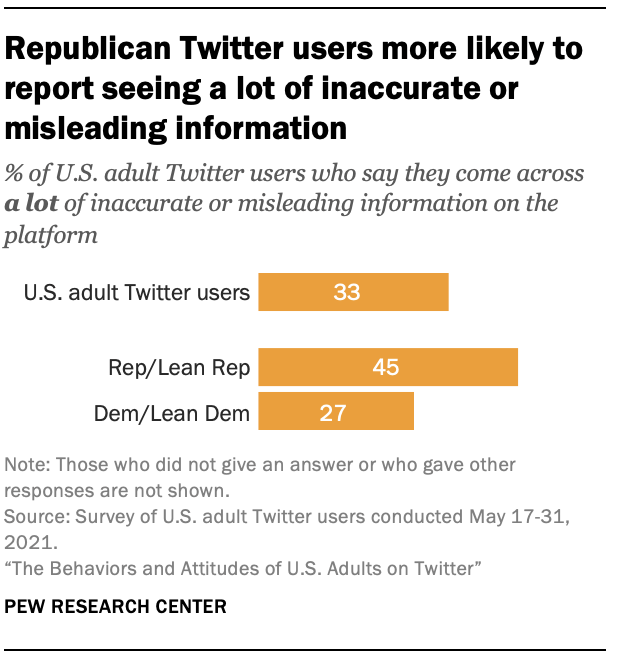
On the other hand, the vast majority of Twitter users (91%) say they come across at least some inaccurate or misleading information on the platform. And 33% say they come across a lot of this sort of content.
Republican Twitter users are more likely to say they come across a lot of this information than Democrats – an 18-point difference between the parties.
Republicans and Democrats differ in their views of whether Twitter is good or bad for American democracy, what the major problems are on the site
Overall, Twitter users are divided on the site’s impact on American democracy. Some 37% think its impact has been mostly good, but a nearly identical share (38%) say it has been mostly bad. The remaining 24% say it has had no impact on American democracy.
But these attitudes differ significantly based on political affiliation. About half of Democratic Twitter users (47%) say the site has had a mostly good impact, while 28% say that impact has been mostly bad. But among Republican users, fully 60% say the site has been mostly bad for American democracy and just 17% say its impact has been mostly good.
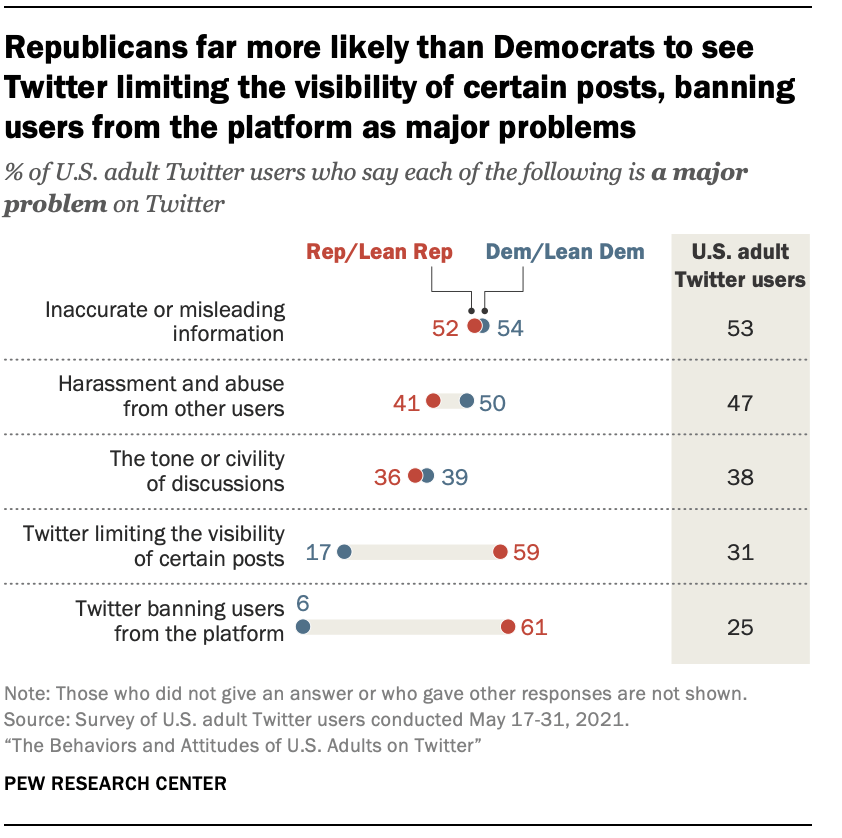
When asked about their views on some challenges and controversies facing Twitter and other social media platforms, around half of Twitter users say the presence of inaccurate or misleading information (53%) and harassment and abuse from other users (47%) are major problems on the site. And 38% say the same about the tone or civility of the discussions there. Smaller shares say that Twitter limiting the visibility of certain posts (31%) or banning users from the platform (25%) are major problems.
Republican users are far more likely to say that Twitter banning users from the platform or limiting the visibility of certain posts is a major problem. By contrast, Democrats are more likely than Republicans to see harassing or abusive behavior as a major problem on the site. Partisan views are similar when it comes to how large a problem inaccurate information and the tone or civility of discussions are.
Around one-in-five Twitter users think nobody sees their tweets, but about half consider how their activity on the site might portray them before doing something visible to others
Most users assume their tweets have a very limited audience. Regardless of how often they tweet, roughly two-thirds of Twitter users think only a few people would see content they might share on the site. And about one-in-five Twitter users say they think nobody would see it.
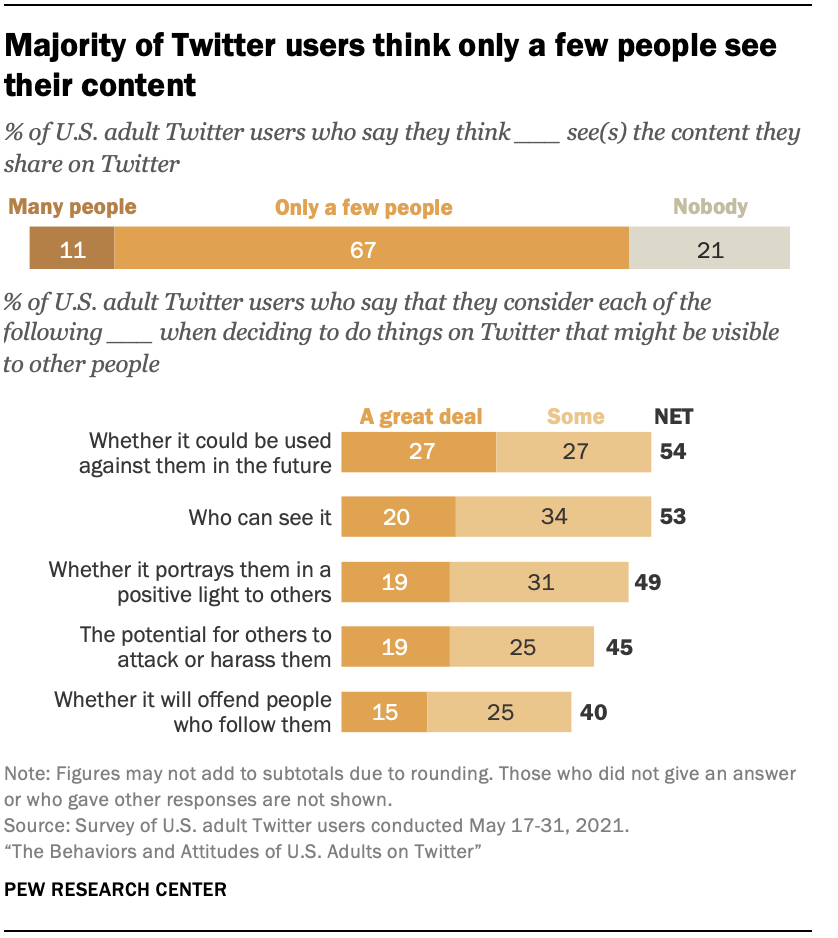
Despite largely assuming a limited audience for their tweets, more than half of Twitter users consider whether the content they post publicly on Twitter could be used against them in the future before doing something that might be visible to other people on the site. And comparable shares consider who can see these things, or whether that activity portrays them in a positive light to others. This includes 27%, 20% and 19%, respectively, who say they consider each a great deal. Some 45% of users also consider the potential for others to attack or harass them a great deal (19%) or some (25%). And 40% say the same about whether it will offend people who follow them (including 15% who consider this a great deal).
For some users, these concerns are not just hypothetical. About one-in-five Twitter users (21%) have posted something on the site that they later regretted sharing. And this is true of a larger share – 31% – of users ages 18 to 29 compared with older Twitter users. Men are somewhat more likely to say they have experienced this than women (24% vs. 17%), as are Democrats compared with Republicans (23% vs. 16%).
Majority of users like others’ tweets rarely or on occasion, typically do so to show support or agreement
A relatively small share of Twitter users (16%) say they almost always like other users’ tweets when they use the platform, while the bulk of users do so only occasionally or rarely. Among the 87% of Twitter users who say they ever “like” tweets on the site, about two-thirds (67%) say they mainly do so to show their support or agreement rather than bookmarking the tweet (10%) or boosting its visibility (9%). And 12% of these users say there’s no particular reason they like tweets.




